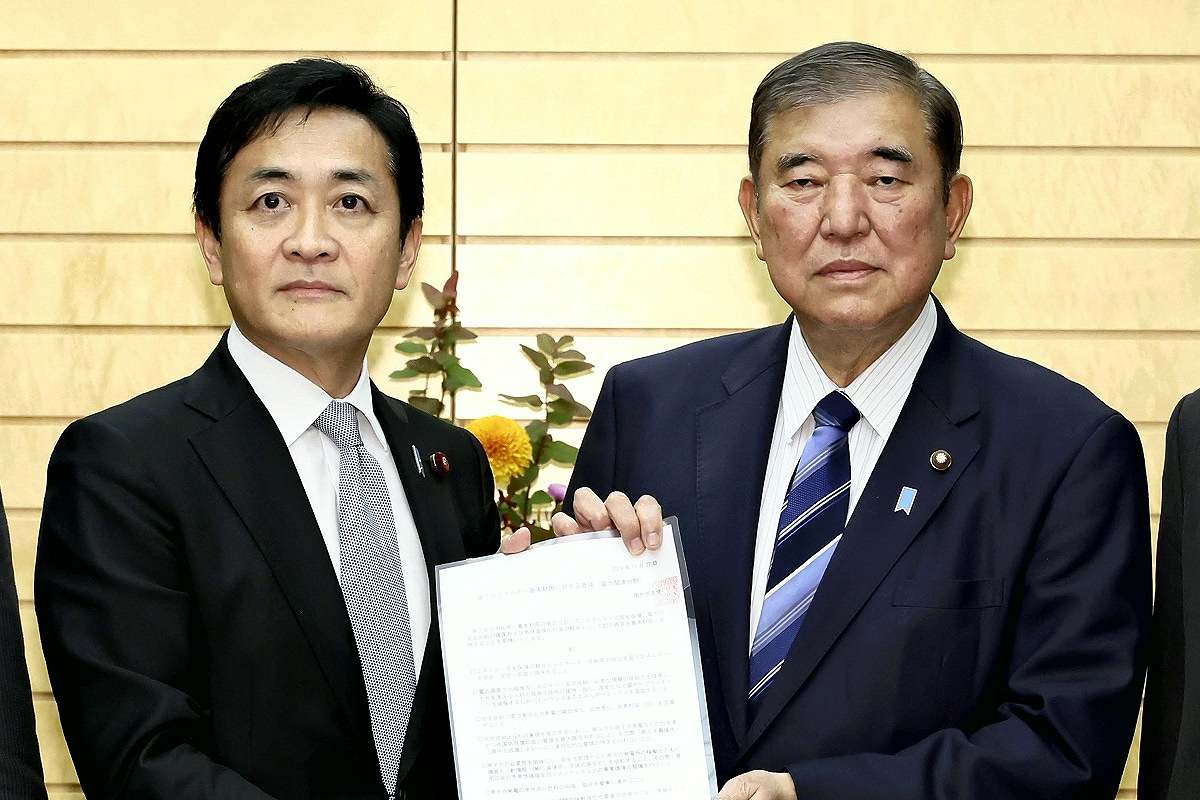DPFP Calls for Building, Expanding Nuclear Power Plants as Party Looks to Stretch Policy Reach

Prime Minister Shigeru Ishiba, right, receives proposals on energy policy from Yuichiro Tamaki, head of the Democratic Party for the People, at the Prime Minister’s Office on Wednesday.
21:00 JST, November 28, 2024
The president of the Democratic Party for the People, Yuichiro Tamaki, has proposed building more nuclear power plants and expanding existing plants, among other energy policies, in a set of proposals handed to Prime Minister Shigeru Ishiba on Wednesday.
The DPFP aims to take the initiative in energy discussions, following a review on raising the income level at which income tax is levied from ¥1.03 million.
“We’ve written in the proposals that we should be actively building and expanding nuclear power plants, a proposal the Liberal Democratic Party did not include [in its election pledges for the House of Representatives],” Tamaki said at the beginning of his meeting with Ishiba.
The meeting was also attended by Yoshifumi Hamano, head of the DPFP’s election strategy committee, and others. Hamano once held a senior position at the Federation of Electric Power Related Industry Worker’s Unions of Japan, an industrial federation under the umbrella of the Japanese Trade Union Confederation, or Rengo.
Ishiba said the use of nuclear power is premised on safety. “We would like to tackle the issue, bearing in mind safety, stability and low prices,” he said.
The DPFP is requesting that its proposals be reflected in the basic energy plan, which will be the guideline for the country’s mid- to long-term energy policy. The government plans to revise the plan by the end of this fiscal year. The opposition party is calling for a more explicit statement of the need for nuclear power and plans to replace, expand and build new nuclear power plants while ensuring their safety.
The government aims to compile the basic plan’s outline within the year and have it adopted by the Cabinet by the end of the fiscal year. It plans to present a goal for the power source mix in fiscal 2040, with many watching to see how it will position nuclear power.
Power demand in the country is expected to soar with the spread of artificial intelligence, as an increasing number of power-hungry data centers and semiconductor plants come online.
Some within the government and the LDP expect that getting the opposition party on the ruling bloc’s side will provide a “tailwind for pushing forward nuclear power policy,” as a government source put it.
In the Wednesday meeting, the prime minister met Tamaki to receive his requests at the Prime Minister’s Office. “The DPFP is being treated extremely well,” said a mid-ranking LDP member.
The minority government hopes to gain the DPFP’s cooperation, while the opposition party aims to get its policies realized. They are looking at collaborating not only on energy but also security policies, such as an active cyber defense.
But the LDP’s junior coalition partner, Komeito, is in a complicated position as the party is resistant to building new nuclear plants. Some within the party have expressed anxiety over greater potential cooperation between the LDP and the DPFP in a wide range of areas besides energy. “It could weaken our role as a brake on the administration,” said a party executive.
The government and the LDP are expected to keep a watchful eye on both the DPFP and Komeito.
Top Articles in Politics
-

Japan PM Takaichi’s Cabinet Resigns en Masse
-

Sanae Takaichi Elected Prime Minister of Japan; Keeps All Cabinet Appointees from Previous Term
-

Japan’s Govt to Submit Road Map for Growth Strategy in March, PM Takaichi to Announce in Upcoming Policy Speech
-

LDP Wins Historic Landslide Victory
-

LDP Wins Landslide Victory, Secures Single-party Majority; Ruling Coalition with JIP Poised to Secure Over 300 seats (UPDATE 1)
JN ACCESS RANKING
-

Producer Behind Pop Group XG Arrested for Cocaine Possession
-

Japan PM Takaichi’s Cabinet Resigns en Masse
-

Japan Institute to Use Domestic Commercial Optical Lattice Clock to Set Japan Standard Time
-

Man Infected with Measles Reportedly Dined at Restaurant in Tokyo Station
-

Israeli Ambassador to Japan Speaks about Japan’s Role in the Reconstruction of Gaza























